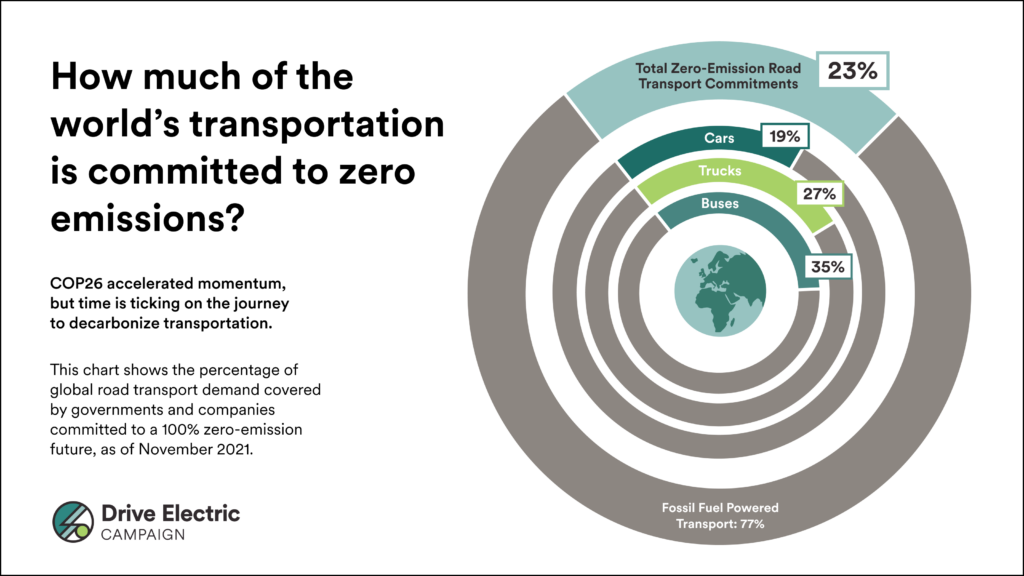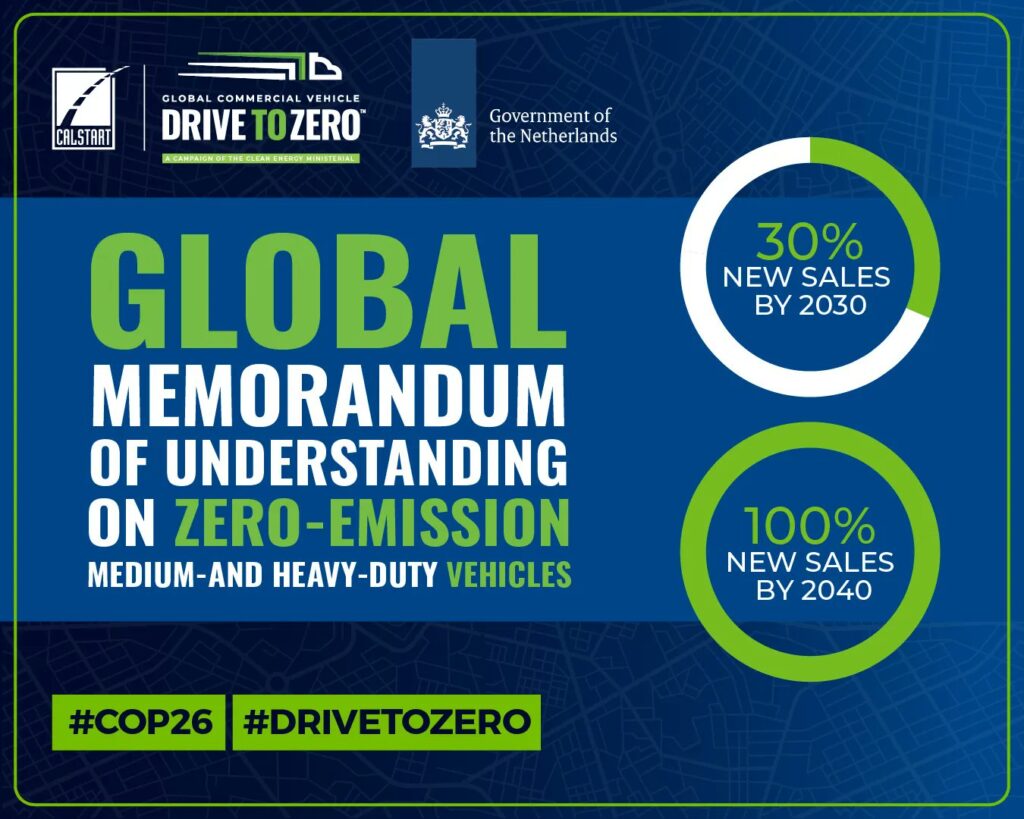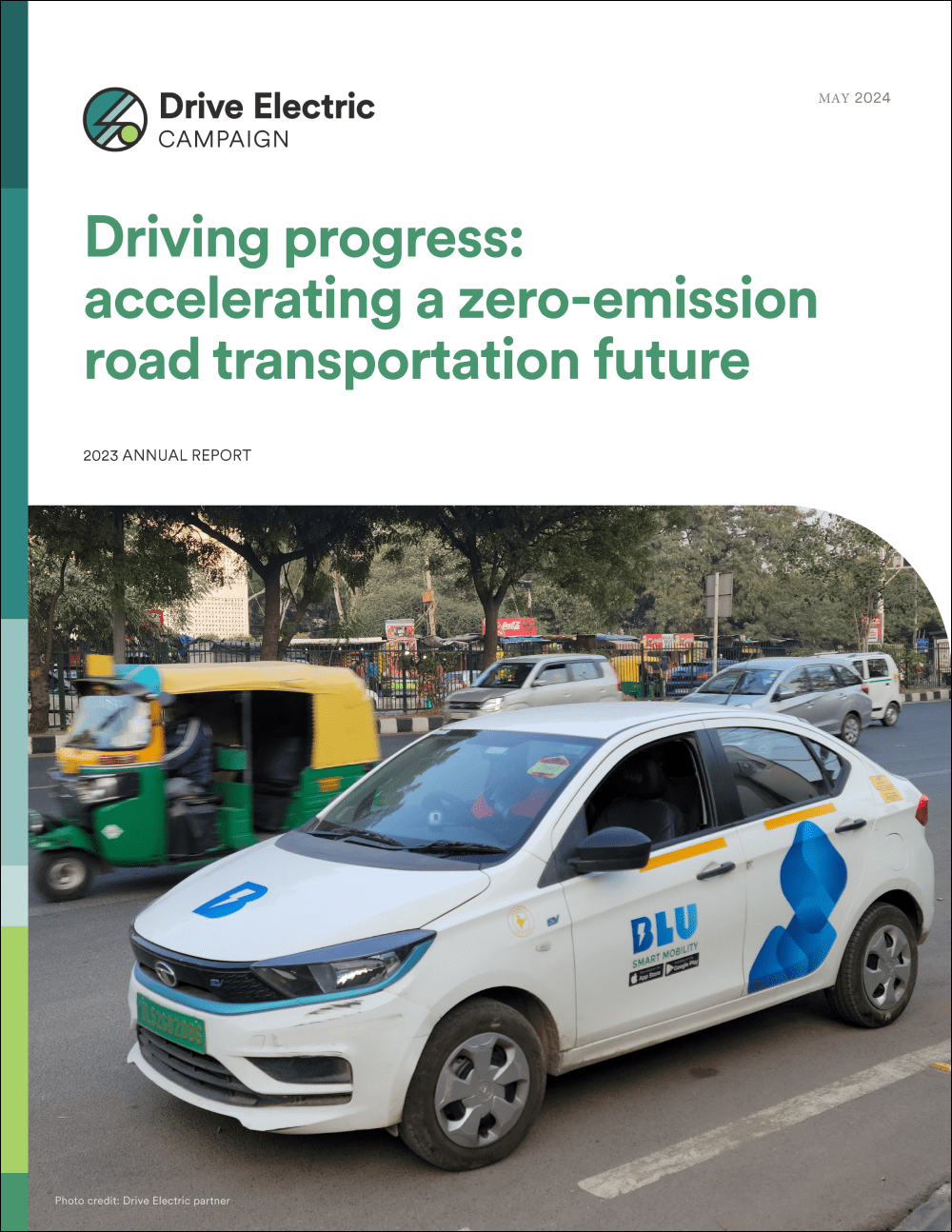COP26 Energizes the Shift to Clean Electric Transport
This year’s global climate conference was the first to emphasize the benefits of accelerating zero-emissions transportation, and Drive Electric partners showed up in full force.
Over the past two weeks in Glasgow, the primary focus of the 2021 UN Climate Convention’s Conference of the Parties (COP26) was negotiating the rule book for Paris Agreement implementation, and to secure climate finance for vulnerable countries. Encouragingly, significant political and civil society energy was also focused on elevating climate solutions and ambition from major emitting sectors, including Transport Day on November 10th. Leading up to COP26 and throughout the conference, numerous Drive Electric partners coordinated campaigns, events, and announcements to accelerate the ambition of transportation electrification. This is key to achieving our decarbonization goals and keeping global warming under 1.5 degrees.
At COP26, over 100 parties including governments, businesses, investors, and civil-society commit to 100% zero emission transport future This has the potential to accelerate the pace of electrification– these signatories account for nearly 1 in 3 global car sales by government commitment and 1 in 4 global car sales by automaker commitment. Our own preliminary analysis estimates that the COP26 announcements together mean that nearly 25% of global road transportation — of all modes, including cars, trucks, and 2 and 3 wheelers — is now committed to a future of 100% zero-emission vehicles.
Some key players were missing from this Declaration — namely the US, Germany, and Japan as well as some legacy companies like Volkswagen and Toyota. And yet this is still a positive development.
Let’s dig in to what this means and what’s next in the journey to decarbonizing road transportation.

COP26 Signals the End of Polluting Vehicles
The multitude of commitments at this year’s COP26 are a strong signal that the end of polluting vehicles is near and zero-emission transportation is the future. While the official COP26 is a diplomatic negotiation with 197 countries, this effort was advanced in parallel through the UK Presidency and the COP26 Climate Champions and made possible by an ecosystem of dedicated advocates, researchers, and policy experts.
It’s Transport Day at #COP26
Road transport accounts for 17% of global emissions, and its emissions are rising faster than other sectors.
We need to speed up our move to zero emission vehicles.
Read more from @UNFCCC 👉 https://t.co/4p0V7TeOGm#TogetherForOurPlanet pic.twitter.com/OWwsBrd8lb
— COP26 (@COP26) November 10, 2021
The Glasgow Declaration on Zero-Emission Cars and Vans was signed by over 100 parties who have agreed to support an accelerated transition to zero-emission vehicles including all sales of new cars and vans to be zero emission in 2035 in leading markets and 2040 for the rest of the world. Signatories include:
- 31 countries (including Chile, Netherlands, Uruguay, Slovenia, UK, etc.)
- 38 subnational governments (including California, New York, Scotland, Australian Capital Territory, Gangwon Province, plus cities like La Paz, Sao Paolo, etc.)
- 11 vehicle manufacturers (Ford, GM, Volvo, Daimler, BYD Auto, etc.) 27 major fleets (IKEA, Leaseplan, Unilever, Uber, Siemens, etc.)
- 15 investors and financial institutions, and more (including Drive Electric!)
Under the new Global Memorandum of Understanding (MOU) for Zero-Emission Medium- and Heavy-Duty Vehicles (ZE-MHDVs), 15 governments agree to work together toward 100% zero-emission new truck and bus sales by 2040. Austria, Canada, Chile, Denmark, Finland, Luxembourg, Netherlands, New Zealand, Norway, Scotland, Switzerland, Turkey, United Kingdom, Uruguay and Wales are setting an interim goal of 30% zero-emission new vehicle sales by 2030. Global Commercial Vehicle Drive to Zero has created an interactive dashboard to track and show policy development in leading regions. In a coordinated effort, subnational governments – like Québec (Canada), and Telengana (India) – as well as top manufacturers and fleets like Scania, DHL, and Heineken are endorsing the MOU and agreeing to work collaboratively toward the same 2030 and 2040 goals.

Under the Transportation Decarbonization Alliance, 35 companies, countries, regions and cities committed to accelerate the rollout, planning and deployment of a comprehensive network of electric vehicle (EV) charging infrastructure, thereby enabling a faster shift to zero-emission transport. This is a key supporting piece to make sure that communities are confidently able to uptake the electric transportation options that will be increasingly available.
Still, our estimates show that only a portion of zero-emission transport commitments are binding. More effort is needed to convert these commitments into policy and investments.
Our partners at Count Us In organized over 35 businesses, transport initiatives, grassroots organizations and influential individuals to sign the Count Us In Citizens’ Declaration, calling on world leaders to adopt comprehensive policy measures that support the end of pollution from road transport. It says countries with the highest levels of road transport pollution must ensure that all new buses are zero-emissions by 2030, followed by new light-duty vehicles by 2035 and new heavy-duty vehicles by 2040.
These timeline milestones are aligned with the Drive Electric coalition’s ambitious vision — the movement we need to make as a global community across all modes. Our partners are advancing programs to implement the clean transportation solutions we need now.
The Zero Emission Bus Rapid-deployment Accelerator (ZEBRA) announced a new commitment from investors of more than $1 Billion USD in zero-emission public bus fleets in Latin America, organized by C40 Cities and the ICCT. Switching from diesel to clean buses provides immediate health and climate benefits, though e-buses currently comprise just 1% of total fleets in the region. C40 Cities shared they “will be working hard with all our mayors in the global south to hitch this commitment to innovative, viable and fungible infrastructure projects to kickstart a public transport revolution around the globe that gets us to the 1.5 degree target.” To reach this climate target, C40 and the ITF have released new data showing that public transport in cities must double.
Our partner SLOCAT underscores the role of public transport as one of 11 key transformations for sustainable, low carbon land transportation, in their messaging guidelines launched during COP26. One way to move the needle on transformation transportation is supporting safe cycling. The ITDP Cycling Cities campaign aims to do that, with 50 cities from around the world already participating in policy and market-based actions to bring safe cycle lanes to 25 million more people by 2025. With e-bikes as the best-selling form of electric mobility, these infrastructure shifts will measurably drive change.
In the final hours of Transportation Day at COP26, the Glasgow Declaration was updated to expand recognition beyond cars and vans: “We recognise that alongside the shift to zero emission vehicles, a sustainable future for road transport will require wider system transformation, including support for active travel, public and shared transport.”
This was a welcome addition given the need to tackle all segments that can contribute to much cleaner and healthier streets.
Now is the Time to Accelerate
This is all encouraging and should be celebrated – and there is much work yet to do to catalyze this transformation at the speed and scale needed. Not all the countries and stakeholders we need are fully onboard yet, and many signatories still need to adopt or implement the necessary policies and investments. We are amazed and inspired by the momentum and results that Drive Electric partners have generated, and we know that this coalition will push these critical actions forward. From helping governments develop model policies, to raising corporate fleet ambition, and engaging the communities most impacted by polluting transportation, Drive Electric partners are galvanizing intention into meaningful implementation with many ways for all to get involved.
We need to move much faster and spread the benefits further. With your help we can make that happen — we look forward to partnering with you as we create a vastly cleaner, more equitable, and more sustainable transportation future together.
